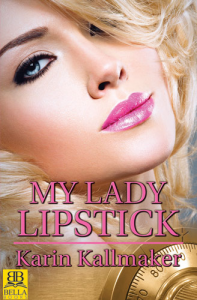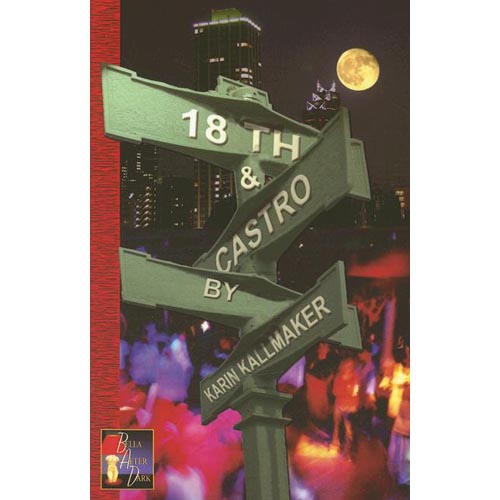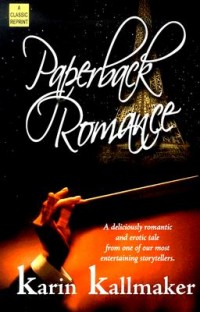Tag Archives: Karin Kallmaker
Anna reviews Roller Coaster by Karin Kallmaker
As I’ve mentioned before on this site, I’ve read pretty much everything written by Karin Kallmaker, and I am pleased to report that Roller Coaster is her best effort in years. The novel is almost twice as long as her usual work (according to her blog it’s the longest book of her career), and her deliberate approach pays off as she takes valuable time to develop her characters and build a believable scenario.
Two women, an aspiring chef and an aspiring actress, meet on a stalled roller coaster for a brief but candid exchange that changes each fundamentally. Twenty-three years later, Laura Izmani finds herself interviewing for the position of private chef for the famous stage actress Helen Baynor. Laura knows very well that Helen is the woman she met on the roller coaster, but is wary of bringing up the incident because she divulged her struggle with cocaine use at the time. Helen splits her time between New York and California, but her fierce devotion to her children–twins whose father died when they were in the womb–and money mean that she can afford the services of a personal chef to cook for them while she is out of state.
Laura has spent the intervening years roaming the globe, and is hoping to settle herself in a quiet place for a while before figuring out her next step. Her identity as the product of a Jamaican mother and a white father means that she’s acutely aware of potential outsider status, especially in the rich enclave in which Helen resides. For her part, Helen is struggling with the challenges of growing older in the public eye and finding roles so she can continue a remarkable career. She has sacrificed most personal relationships, aside from motherhood, to the pursue life on the stage.
As Laura and Helen encounter romantic challenges with other people, Kallmaker quietly but effectively sets the stage for their relationship as they live and work together in a family setting. But there are still several secrets between them–Laura continues to be reluctant about revealing their shared past–and Kallmaker makes her characters work for a satisfying conclusion. Recommended.
For a lesbian romance with a similarly driven actress as a main character, try Gun Brooke’s Course of Action.
Danika reviews 18th & Castro by Karin Kallmaker
18th & Castro by Karin Kallmaker is a collection of stories set on Halloween in the Castro. It’s part of the “Bella After Dark” (erotica) collection of Bella Books, which I wasn’t aware of when I picked it up. It’s still not entirely erotica, though. The emphasis is more on the characters and relationships than the sex.
I love that storytelling device of stories weaving together, and this collection does that well. As the title suggests, almost all of the stories take place in one apartment complex. Characters that are barely mentioned in one story get their own several stories later. Moments witnessed by bystanders get continued somewhere else.
And the stories are interesting! It’s the dynamics that drew me in. Budding relationships, years-long relationships, old and young lovers are all in the mix. Each story has the characters interacting in unique ways, though. They seemed rounded, even if they don’t get a very long story.
There’s also the bonus factor of Halloween, of course! It isn’t overwhelming (there’s only one story with a supernatural element, many characters stay home), but it’s a nice background theme for the season.
I did have a few problems with the stories, though. One is the hint of cissexism (equating lesbianism only and always with vulvas) that crops up more than once. Another was that although the dialogue seemed natural and unique to each character most of the time, the sex talk seemed really awkward to me, and it all seemed awkward in the same way. Almost all of the characters referred to their partner as “baby,” which perhaps is just a personal pet peeve, but still seemed too uniform. The sex talk in general just seemed stilted.
Other than that, though, it was a strong collection, and a good first introduction to Karin Kallmaker.
Anna reviews Paperback Romance by Karin Kallmaker
I recently picked up a stack of lesbian romance novels at a used bookstore, and Karin Kallmaker’s Paperback Romance (1992) was among them. It wouldn’t be an exaggeration to say that I’ve read almost everything she’s written (and own copies of most of her books), but it’s been a very long time since I read this one, so I decided to give it another go. I had a nagging feeling that I hadn’t really enjoyed the book–now nearly twenty years old–the first time around, and I wanted to see if it was due to the book itself or simply my circumstances at the time.
Carolyn Vincense is a successful author of (straight) romance novels who has recently returned from a trip to Paris in which her illusions of romance were shattered after a whirlwind romance and marriage. A virgin on her marriage night, Carolyn comes to the conclusion that she must be frigid and attempts to deal with the writer’s block that inevitably follows her loss of faith in her subject matter. Her agent and best friend Alison is a lesbian who has been in love with her for the past fifteen years, but hasn’t come out to her for fear of losing their friendship and the fleeting moments of closeness that she craves.
When Carolyn receives a substantial check as a result of her writing success, she returns to Europe to savor a musical tour through its famous places. On the first stop (Paris, again) she is unfavorably impressed by the up-and-coming director, Nicolas Frost, who is brilliant with the baton but rather rude in person. Nicolas is really Nicola, a gay woman passing as a man in order to make it in the high-stakes world of music. She and Carolyn cross paths several more times, and their attraction heightens as Carolyn discovers Nicola’s secret and realizes that she may be a lesbian. When Alison arrives in Rome to–finally–declare her love and discovers Carolyn with Nick, Carolyn realizes that she and her best friend may have some unfinished business that has nothing to do with book sales. Will she continue her torrid affair with the deeply closeted Nick, or take a chance on love that may not exist?
Having a narrative that encompasses two overlapping romances is a tricky business, because Kallmaker has to make the reader invested enough in the “coming-out” romance with Nick to keep reading, but still intrigued enough by the possibility of an Alison-Carolyn pairing to not care too much if Nick’s heart gets broken. I think this tension is the root of my dislike of the book on first read; it has taken me a while to develop a tolerance for complication in my lesbian romances. When I first read the book, I believed that Carolyn should stay with Nick, the person with whom she had her first same-sex experiences. I identified with Carolyn’s confusion about her sexuality, but couldn’t understand her conflicted emotions about Alison. Life–and love–are often more complicated, however, and Kallmaker does a good job of representing that tension.
Although there are still several elements that are handled less gracefully than I would have liked–Alison’s ogling of her best friend in the first part of the book comes off as kind of creepy, for example, and some of Carolyn’s soul-searching moments are overwrought–the book has good things to say about staying true to yourself (once you figure out what that is). Of the three characters in the triangle, only Carolyn (and Samantha, the woman in love with Alison who keeps that storyline going) has the courage to say “this is who I am now, and I’m not going to hide.” That’s always a positive message, no matter how long ago a book was published.




